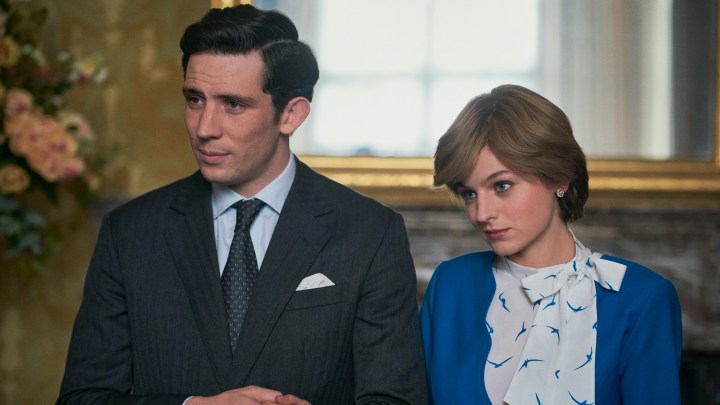Netflix received a whopping 105 nominations at this year’s Emmys, driven by hits like Squid Game, Stranger Things, and Ozark. While it’s a decline from last year’s 129, Netflix still secured the second-most nominations out of any network or streamer, with only HBO beating it thanks to juggernauts like Succession and The White Lotus.
Still, not everything is great for the so-called King of the Streamers. Whether it’s canceling shows left and right or losing subscribers every quarter, the original streamer can’t seem to catch a break, and not even its lush and over-the-top original movies can help. Netflix premiered the tiresome The Gray Man less than a month ago, and the film — which reportedly sports a $200 million production tag — has already left the pop culture vocabulary; not even the news that a sequel and a prequel are coming was enough to stimulate interest.
Indeed, Netflix seems to be at a breaking point in its journey toward long-term success. Its television division is thriving — shows like Stranger Things and Bridgerton dominate the conversation for days, weeks, and even months, attracting favorable reviews from critics and cementing themselves as modern-day classics. Things are different for its film division, though, which struggles to barely make a dent in the pop culture landscape. Not even the combined powers of Chris Evans and Ryan Gosling were enough to make The Gray Man enjoyable, and the same can be said of other big-budget films like The Adam Project and Red Notice.
Why is Netflix so hung up on making original movies when it’s blatantly clear that its strength lies in television content? The streamer tried to make a name for itself in the movie department, delivering a few genuinely gripping masterpieces — the trifecta of Roma, The Irishman, and The Power of the Dog — that will surely become classics. However, that had to do more with the directors behind them than with Netflix itself. All the film projects the streamer has developed internally are average at best and mediocre at worst. On the contrary, its shows keep thriving, both original creations and foreign acquisitions. It’s time for Netflix to wake up: its original movies suck.
But not all is lost; Netflix has some of the best shows on modern television, many of which have reached unprecedented levels of success. Streamers and studios are currently waging an all-out war for dominance of the entertainment landscape, and Netflix could be the undisputed ruler of the small screen. So why is it diluting its efforts? Why is it investing so much in movies, settling for being the court jester of the film industry when it could be the king of television?
The power of the Netflix?

Netflix made a name for itself in the film industry through one simple strategy: throwing copious amounts of money at auteurs, hoping to lure them to its ranks. It worked, if only for a moment. Filmmakers like Alfonso Cuarón, Martin Scorsese, David Fincher, and Jane Campion accepted the cash and delivered on their word to bring prestige to the streamer.
The appeal for these directors is easy to see: they had full creative freedom and tons of cash to do deeply personal projects that might not have been well-received elsewhere. Working with little to no restriction and in full control of their craft allowed them to produce some of their best work to date, with modern masterpieces like Roma and The Power of the Dog elevating the streamer’s portfolio past its initial big-fish-in-a-small-pond status. Soon, awards came knocking, but Netflix proved its shortsighted nature by running not one or two, but four spectacularly clumsy awards campaigns.
Netflix either underestimated its competition or overestimated itself.
The streamer’s failure to bring any genuine gold to its prestige projects suggested it was more a pretender than a genuine threat in the film business. The failure to earn Roma the Best Picture Academy Award is particularly jarring; however, the streamer’s shockingly bad campaign for Campion’s The Power of the Dog is a stain from which it may never recover. The film received 12 — let me repeat that, 12 — Oscar nominations at the 94th Academy Awards. It won one. To make matters worse, Apple TV+, a rival relatively new to the streaming wars, won the Oscar for Best Picture with CODA.
Netflix was supposed to be the first streamer to claim Best Picture. It’s the main reason it spent all that money to lure Cuarón and Scorsese and Fincher. However, it either underestimated its competition or overestimated itself. Whatever the reason, its blatant inability to exploit its extremely valuable assets made it something of a laughingstock in an industry that takes perverse glee in the destruction of icons.
Things aren’t looking better in the blockbuster department. Netflix is throwing cash at dumb action films with big stars, scenic locations, and impressive set pieces. However, it’s basically money down the drain; each new entry is more forgettable than the one before, fulfilling the same purpose as the average and considerably cheaper original movie that first built Netflix. Does anyone even remember Red Notice? Sure, we all saw it when it came out because there are worse ways to spend a Friday evening than watching an action mess starring Dwayne Johnson, Ryan Reynolds, and Gal Gadot. But did we care? Did we even pay attention? I don’t think I can name any of the characters, much less the plot’s details.
It’s slowly becoming clear that Netflix’s lack of a strategy will be the downfall of its film division. Whereas other studios have verticals aimed at specific purposes — why else would Fox Searchlight and Sony Pictures Classics still exist if not for the sole purpose of winning Oscars? — Netflix’s attempts at doing it all result in embarrassment after embarrassment. A single studio can’t be everything; battles must be chosen to prevail in the long term. Just ask Warner Bros. Discovery.
The television crown

Things look considerably different on the television side. On the big screen, Netflix reigns supreme, if not yet undisputed. Since its initial incursion into the TV industry with the now-shunned House of Cards, Netflix has maintained momentum and purpose on its way to the top. Shows like The Crown and The Queen’s Gambit cemented it as a dominant figure on the small screen. Its reign reached a zenith at the 2021 Emmys when it claimed the trophies for Outstanding Drama and Outstanding Limited Series. Five of its actors also won Emmys, and while Apple TV+ and HBO also had strong showings, it was the closest thing to a Netflix night the streamer ever had.
Recent releases can’t compare to Stranger Things and its dominance of the pop culture landscape.
Beyond critical acclaim and industry love, Netflix shows have something many others would kill for: audience engagement. The recent releases of Bridgerton and Ozark brought the streamer considerable attention, with both shows dominating the conversation. Bridgerton‘s brand of sexy historical romance was bound to be popular, but Ozark‘s triumph is more impressive considering its dark subject matter, placing it in a select group including The Sopranos and Breaking Bad as unforgiving shows that still generate intense audience engagement.
But even these two recent releases can’t compare to Stranger Things and its dominance of the pop culture landscape. I could write an entire essay on the show’s grip over social media; indeed, any show powerful enough to help a nearly 40-year-old single make it to the Top 5 in the Billboard Hot 100 in the year of our Lord 2022 is worthy of praise. As I type this, Kate Bush’s Running Up That Hill is currently at No. 4 on the chart, two months after Stanger Things debuted its first seven episodes.
Foreign acquisitions are also making all the difference for Netflix. Squid Game and Money Heist are two of its most-watched and discussed projects, attracting considerable praise and generating intense fan interest. Both properties are now franchises, with Money Heist already receiving a spiritual sequel and a spin-off centered on the character of Berlin. For its part, Squid Game is a genuine phenomenon. The show was overnight success, becoming the streamer’s most-watched show ever with an obscene 1.65 billion hours watched.
Even its worst shows generate interest, if only because people hate-watch them. Think of Ginny & Georgia, Emily in Paris, and Too Hot to Handle, shows that are objectively bad, yet still attract considerable attention. Now, compare them to, say, Persuasion, the recent Netflix adaptation of Jane Austen’s classic novel. Yes, Persuasion was bad, and everyone loved tearing it down. But less than a month after its release, the silence is deafening; no one is talking about it. However, once Emily in Paris returns for its inevitable third season, the discourse will start again, even if it’s only to mock the inept heroine’s terrible taste in couture. By their very nature, shows have staying power. Few, if any, movies can keep up with that, much less Netflix’s originals.
Stranger Netflix things

There’s no shame in admitting defeat, or at least, there shouldn’t be, and it’s more than clear that Netflix has lost the film war. The streamer can’t keep up with the major movie studios that do this for a living and have years of practice in supporting and exploiting their projects to their utmost. It also lacks Apple TV+’s restraint. Netflix can’t seem to stop itself from wanting all; it tries everything and succeeds at only half of it. But when it succeeds, it succeeds.
Netflix could rule television.
Television gives Netflix the chance to become the master of the house and finally take its coveted seat at the head of the table. Why should it keep diluting its efforts when it already has a solid foundation to challenge HBO for the title of prestige TV king? Netflix could dominate the Emmys if it wanted. It could continue offering English language and foreign content, driving the conversation and becoming a trendsetter. In short, Netflix could rule television. It already is doing just that. Other streamers and networks would kill for the kind of engagement Heartstopper received; compare it to the attention Peacock’s Queer as Folk reboot, Apple’s Dickinson, or Hulu’s Love, Victor received, and you’ll see a Netflix show still has a significant degree of importance over the entertainment landscape.
For better and worse, Netflix is still the King of the Streamers, and if it wants to keep its crown, it needs to choose its battles. Television is the future for Netflix, and ignoring this can only bring further embarrassment. You fought the good fight, Netflix, but films are just not your forte. Bow down with grace and go back to television, where you thrive. You might never win an Oscar, but you should dominate at the Emmys, and that’s just as good.



